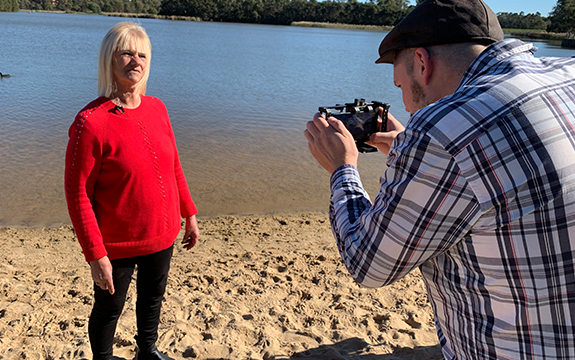Using storytelling to reduce ageism in the community

In Summary
- A digital storytelling project is being used to prevent ageism that can lead to elder abuse
- Part of a project exploring how ageism plays out in the day-to-day experiences of older people and to better understand its trajectory towards elder abuse
Digital storytelling is being used to prevent ageism and reduce the chances of elder abuse, as part of a project led by Swinburne University of Technology.
The digital storytelling program is the second stage of one of Australia’s first investigations of ageism as a driver of elder abuse, the OPERA Project: Older People, Equity Respect and Ageing.
A collaboration between Eastern Community Legal Centre and Swinburne, the program has used extensive community consultation to explore how ageism plays out in the day-to-day experiences of older people and better understand its trajectory towards elder abuse. It is funded under the Victorian government’s Office for Women’s ‘Free from Violence’ grant program.
A key driver of the videos was to disrupt negative attitudes about getting older.
Filmmaker and Swinburne lecturer Dr Max Schleser say that disrupting negative attitudes was key to this project.
“We used community consultation and co-design strategies to make video stories that presented older people making a difference to their community and challenge the negative assumptions about getting older,” says Dr Schleser.
The digital interventions used digital storytelling to disrupt ageism by celebrating older people’s diverse stories and experiences, including planning for older age, increasing social connection and keeping active and healthy.
The digital stories celebrate older people’s diverse stories and experiences.
Community consultations
The digital stories were created following community consultations undertaken as part of the OPERA Project.
Swinburne researchers from the Social Innovation Research Institute developed the co-design digital intervention into ageism based on the consultation findings.
“By consulting directly with older people we gained much deeper knowledge of how ageism is expressed and experienced”, project lead and senior lecturer in Media and Communication Dr Diana Bossio says.
“The consultations meant we were much better placed to understand the types of interventions that would be most appropriate and impactful in a community setting.”
Through direct consultations researchers gained a deeper knowledge of how ageism is expressed and experienced.
Key findings from the report
The community consultations found three social contexts that perpetuated ageist assumptions and behaviours:
- individualism, consumerism and glamorisation of youth and paid work;
- rigid gender roles dictating behaviour into older age; and
- negative stereotypes and expectations around the experience of ageing.
These social contexts perpetuated an overall negative image of ageing, which participants described as associated with:
- inevitable decline or physical deterioration;
- poor health, infirmity (physical/mental weakness), slowed movement, loss of memory and loneliness;
- social irrelevance and invisibility;
- diminished capacity and dependence on others for decision-making; and
- loss of identity or loss of role in the community or workplace.
Participants suggested that these themes manifested in:
- cumulative economic disadvantage due to perceptions of lacking ability to use technology, complete paid work and pay for rental housing;
- reduced mobility due to lack of transport and infrastructure access provisions for older people;
- experiences of abuse, impatience and invisibility in health and service contexts;
- shouldering the brunt of caring responsibilities due to cessation of paid work; and
- expectations of friends, colleagues and family members around what constitutes ‘age-appropriate‘ behaviour
Some participants also acknowledged that their own negative internalised beliefs around ageing had a significant impact on their confidence, abilities and the extent to which they engage with their community.
The digital stories can be seen via opera.eclc.org.au
A report on the community consultation and a report on the design of design of the digital intervention is available through the Analysis and Policy Observatory (APO).

